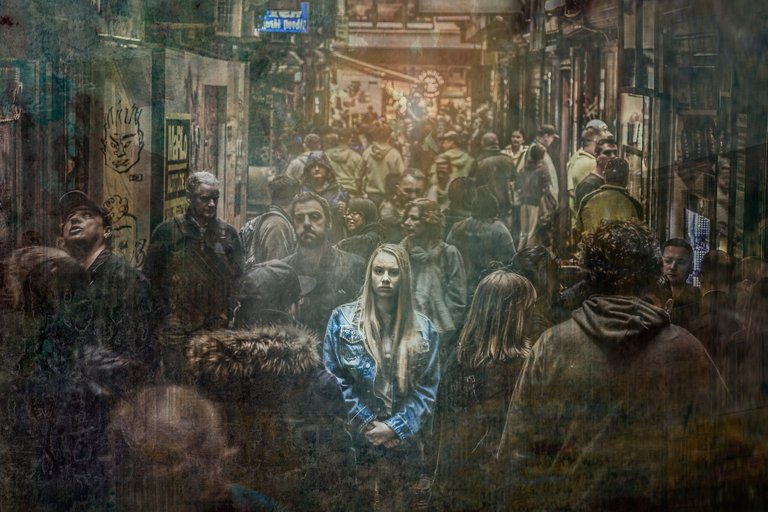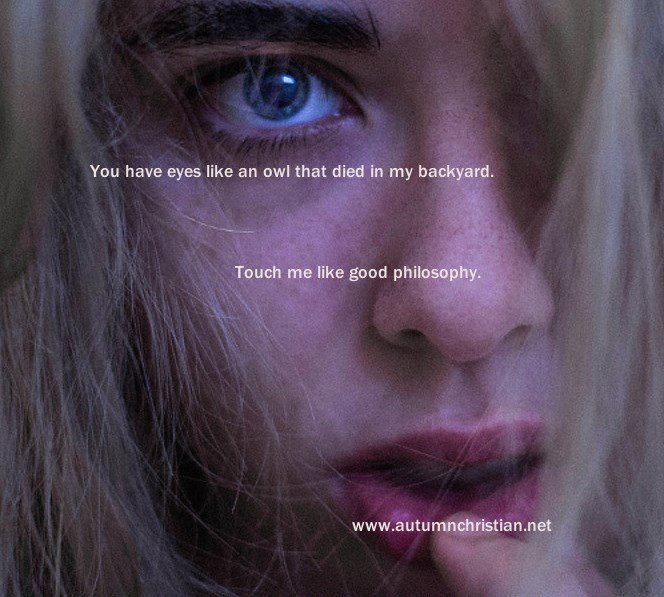
My name is Autumn, and I’m an empath.
Sometimes I think there should be support groups for people with a hyper-empathy, a place to gather each week and tell stories about how we have to keep from crying when we see dead birds on the side of the road and how at night sometimes we can barely sleep for the noise of people -feeling emotions- all around us.
Most of what you see on the Internet about empaths is pseudo-spiritual nonsense. They equate empathy with a spiritual gift given from God or a ‘higher spiritual plane’. And most of the people who come up to you and tell you that they are empaths usually just want to feel special, or different.
I’m not going to talk about “vibrations”, or crystals, or psychic powers, or how empathy is a gift. I don’t know why hyper-empathy is a thing, but it makes sense that if some people are sociopaths who have difficulty feeling for others, there would be the opposite - people who feel too much.
Oftentimes empathy comes from a survival instinct, from being born in a traumatic environment where it’s important to gauge the feelings of others in order to be able to quickly avoid pain. This, combined with intelligence and a high sensitivity, often creates someone who is constantly attuned to the feelings of others, and oftentimes with enough context, exactly why they’re feeling them.
That, or they become like me, and try to disassociate from the feelings completely. I was always told I was clumsy, or didn’t pay enough attention. It was because I’d buried myself into my head. I’d be lost adrift in fantasy worlds for hours, reading or writing. I’d take a book with me everywhere so I didn’t have to look up, to see the environment around me. I’d pretend I didn’t know what was going on with people when they were angry or upset, or even when they asked me a simple question.
I walked through a haze for most of the last 25 years.
But disassociation isn’t a solution. Trying not to see isn’t a solution.
Because no matter how much you curl into a ball, try to detach from the world around you, try to squeeze your eyes and make yourself so small and insignificant, you can’t stop seeing.
You can never stop seeing.
An empath often feels that the emotions of other people is their responsibility, because they are so attuned to them. Social situations can leave them feeling drained. It’s not the emotions necessarily, that are draining, but the compulsion to respond to them. Nobody else can seem to see that someone in the group is upset - that their smile is forced, that they feel uncomfortable or like they don’t belong, or that they’ve recently gone through something traumatic, so the empath often takes upon themselves the task of making sure said person is taken care of.
Many of us have learned that if we don’t, bad things happen.
It takes much longer to learn the world isn’t our responsibility, and we aren’t obligated to be heroes and saviors and crucify ourselves because we feel like no one else can.
Sometimes I envy the sociopath and his ease of socialibility. Most people love sociopaths - on the surface a lot of them are warm and friendly. Confident. Many are harmless, they just feel almost nothing. I pick them out of social circles with ease now. Along with the depressed, the borderlines, those eager for affection or attention, those wanting just to fit it.
I wonder if sociopaths have trouble sleeping.
Sometimes I too feel nothing - but it’s like coming up from an underwater grave, pressure on my eyes and mouth. Because I’ve forced myself to feel nothing. Because it’s an active exertion of will.
Whenever I do manage to open my eyes, the world is in brilliant color. The kaleidoscopic displays of everything in motion - the frenetic hum of all matter - is so noisy that sometimes I put my hands to my ears in an otherwise quiet room. Everything exudes its own force upon the world.
It’s overwhelming, and I feel fragile. I’ve been hiding inside layers of psychic skin for so long that underneath the shell, I’m raw. As a child I remembered crying because lights were too bright. I’d scream if my clothes didn’t feel right, saying they were “bumbly.” I’d become hyperfocused on particular objects, or sensations, until they overwhelmed me.
I tried not to feel those things, because they were painful.
But I am empath who has tried to close herself off from feeling pain, and in doing so have also cut myself off from any source of joy.
Look for us sometime: We’ve got eyes that are either downcast, or always searching. Our mouths spill a quiet pain, and sometimes after our laughter a mask slips a little. We can be charming, elucidating, brilliant, and many of us are great at hiding sadness. But we carry with us a heaviness. In our shoulders, in our heads, the way we carry our bodies. Nothing for us has ever been easy.
Empaths Anonymous. What would we say to each other, while drinking our coffee from Keurig cups?
“I find myself reaching for the cigarettes when my boyfriend’s shoulders tense in a certain way, because I know he wants one.”
“I oscillate between rage at the world that has hurt me, and sadness whenever I try to hurt it back.”
“I killed a flower growing in the cracks of the concrete, and I cried because I realized you can never get back a beautiful thing that’s been destroyed.”
“I was planning on killing myself, until I saw a flower growing in the cracks of the pavement and realized if it could be strong, so could I.”
Yes, we have a right to feel pain because many people have been ignorant and cruel to us. But we can temper it not by trying to avoid it, but by realizing we don’t deserve the treatment that abject and ignorant cruelty brings.
I’m learning to feel again, to tap into the empathy that for so long felt like a curse bestowed upon me. I watch dogs on the beach and have begun to learn their language. I drink coffee and taste its new flavors. I watch people go on an airplane and realize I understand a lot about who they are but what they wear, and how they stand. Whether or not they’re poor or upper class, whether or not they’re used to wearing suits or feel uncomfortable with a new stiffness, whether they’re lost or composed. I try to appreciate the wind that blows cool over the ocean so I can once again truly feel what it’s like to be loved.
Empathy is not a gift. Wherever it came from, it simply is. And empaths, true empaths, empaths who have been broken by their ability to feel, have to learn how to deal with it if they really want to experience this world in its fullness.

Follow me on twitter, facebook, or on my website. You can also buy my books here
Stock photo from pixabay
Self portrait by me canon t51
Other Posts You May Be Interested In:
The Challenges of Being a Woman Writer: Feminism Part 2
[Intent is The Power Behind Technique [Writer's Journal]]https://steemit.com/writing/@snowmachine/intent-is-the-power-behind-technique-writer-s-journal)
If chosen it will feature in a curation post by @MuxxyBot.
An image from your post may be featured.
Please reply to this comment if you accept or decline.
Works for me, thanks for the nomination!
Aww, I'm sorry you've suffered this pain, and that this has been your experience with empathy, but I understand. Please check out the work of Karla McLaren. She teaches a way of understanding emotions, and handling hyper-empathy that is both grounded (in science and her own experiences) and practical in its approach. I teach her work, and have actually started doing a radio show about it at the new mspwaves.com radiostation. Hyper-empathy can be regulated, and there is a way to enjoy the benefits w/o having to suffer the overwhelm. <3 <3 You're not alone!!
Thank you @uniwhisp. I suspect there's a balance and it won't feel so overwhelming once I become more used to not disassociating. I'll check out Karla McLaren.
<3
That was a refreshing read. I needed to know I'm in no way alone ❤
Wonderful. Thank you for spilling our feelings on paper.
following for more.
In my case this state came about from growing up around volatile and potentially violent stepfathers. (My family tree is rotten with stepfathers - generations of them.) I learned to be hyper-attentive to situations because I wanted to diffuse situations that could hurt my mother or my sister.
I've seen this situation in other families, too. People who have an abusive parent spending their lives on edge, constantly on the lookout for a thought or action that could trigger a rampage, and trying to head it off at the pass.
Yes, women seem to be more susceptible to hyper-empathy than men. But then again I've been psychologically profiled as 79% female so...I guess it's a complex world.
It's unfortunate that our empathy becomes something used purely for survival instinct. I'm sorry that you went through what you did.
Empathy has more of a dark side than you imagine. The alternative by psychopathy is actually quite compelling.
I made a post about that a month ago.
https://steemit.com/science/@ertwro/eight-easy-things-studying-science-has-taught-me